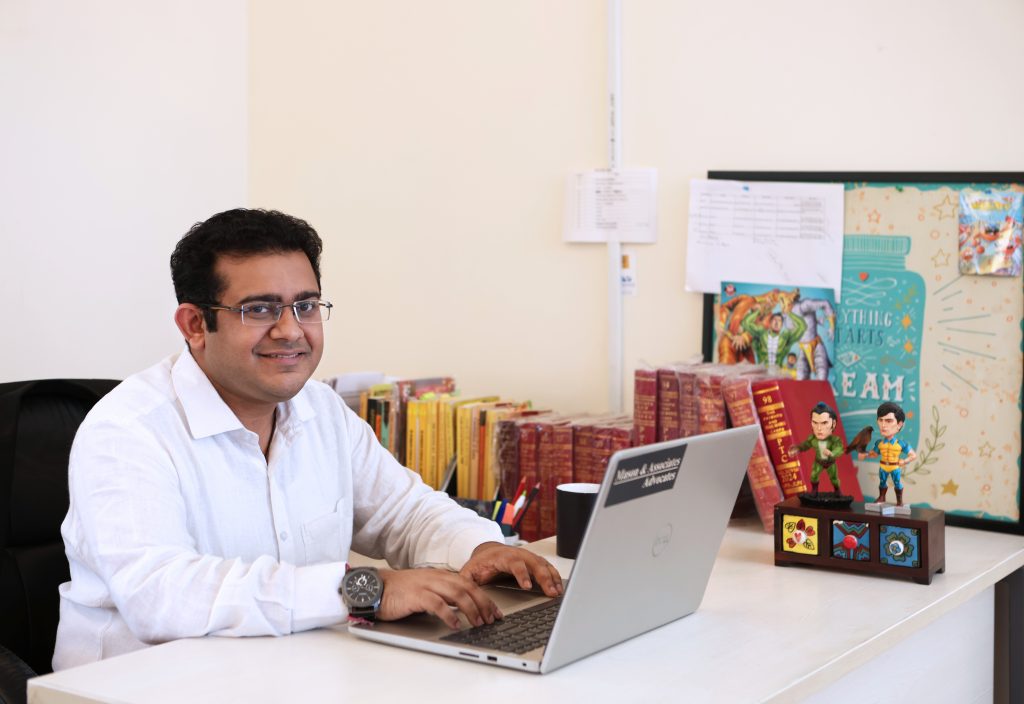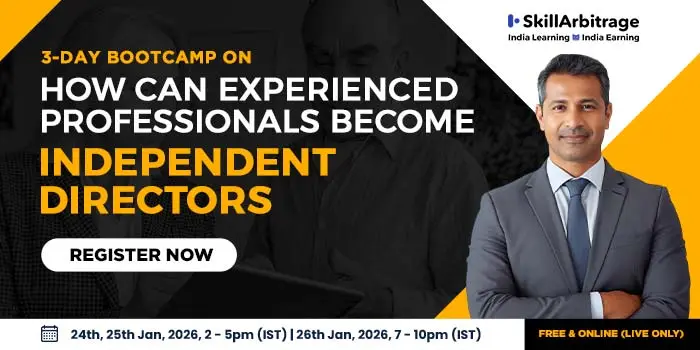This interview has been published by Anshi Mudgal and The SuperLawyer Team

What drew you towards the field of Intellectual Property law, and what were some of the early experiences that helped lay the foundation for your practice in this domain?
First of all, thank you for connecting with me to share my story. I was quite intrigued by the name of the platform ‘Super Lawyer’. This reminded me of the film ‘The Incredibles’ wherein a character Syndrome says that if all humans will have super powers, none will be a Super hero. Similarly, in my view since all lawyers are Super lawyers, thus no single lawyer is a Super lawyer. Now coming to your question:
I think my interest in Cinema. I was initially drawn towards Intellectual Property as a practice area since I had a lot of interest in movies. I was highly inclined towards Copyright Law, since I wanted to understand how the film industry functions.
As far as early experience that helped me lay the foundation in this domain are concerned, the first litigation matter that I worked upon was a passing off suit. In that suit, over a period of time after filing the suit, Defendant had obtained registration of its trade mark and moved an application for amendment of written statement to plead its registration. At that stage, when I was too young (barely a month into the practice) I thought that the Plaintiff’s case was over since the Defendant had obtained a trade mark registration. At that stage, my then senior told me that registration of Defendant’s mark is of no consequence in a suit for passing off, which is maintainable even against a registered proprietor. He further asked me to read N.R. Dongre and Ors. vs. Whirlpool Corpn. and Anr.; 1996 PTC (16) 583 (SC) wherein apex Court upheld this position arrived at by Single Judge and Division bench of the High Court.
You argued a landmark case where the Delhi High Court, for the first time, ruled on the registrability of geographical names as arbitrary trademarks. Could you share your insights from the case that shaped the Court’s reasoning, and what do you believe are the broader implications of this decision?
To be really honest, I don’t know as to whether it was a landmark decision or not. However, Siddharth Suri vs Registrar of Trade Marks does give a guiding light for registration of geographical names as trade marks where the geographical name has been applied arbitrarily to the goods. In this case, the goods were ‘Leather and imitations of leather, and goods made of these materials and not included in other classes; animal skins, hides, trunks and travelling bags; umbrellas, parasols and walking sticks; whips, harness and saddlery’ for which ‘Andamen’ was not found to be having a goods-place association. Accordingly, the objection under Section 9(1)(b) that the trade mark designates geographical origin was not found to be attracted since Andamen (whether said to be taken from Andaman Sea or from the Andaman & Nicobar Islands) does not have a reputation for goods falling in Class 18.
The broader implications of the decision are that when one comes across a geographical name as a trade mark, they should not disregard its protection/registration just because it is a geographical name but analyze whether that geographical area has an association or reputation for goods for which it is sought to be registered/protected.
You advise clients across diverse sectors including FMCG, pharmaceuticals, liquor, book publishing, and e-commerce. Given the rapid growth of the pharmaceutical industry, what are some of the major legal and compliance challenges entities face in this space?
I think as far as the pharmaceutical industry is concerned, the biggest challenge has been counterfeit products. For a consumer, who may consume these counterfeit products; disaster always lurks around the corner to make its presence felt. In other terms, the consumers are extremely vulnerable to life threatening consequences. I have, in the past, worked on multiple matters, both civil and criminal, where the Defendants/Accused produced identical drugs and it is not possible to identify the fake unless you get inputs from the team who worked on the packaging and in some cases research. The pharmaceutical industry is one of the most regulated industries; since it has to cater to safety and efficacy. Keeping this in mind, it obviously has to comply with safety and cleanliness standards, good manufacturing practices, disclosure of information and that too in line with labelling requirements. The major problem in the industry is fake drug racket, which may or may not be related to any Intellectual property and could be a completely new mark, where the ingredients told on the label will not even be present in the drug and the drug would have been sold or supplied clandestinely with no regulatory approval at all.
As a Partner, staying ahead of the curve is crucial. In your view, how effective have the current government initiatives been in streamlining the IP registration process? What further improvements in your opinion can be made?
In recent times, I could think of four initiatives done at the level of the Intellectual Property office which are commendable. First, is the possibility of search of device trade marks, which has been facilitated online by the IP office. The added advantage of this feature is that depending on the device/image the tool also suggests the possible Vienna Code Classifications; which also aids in saving time.
Second, is the enablement of a queue system for various functions and displaying it online; a real time check for hearing, review applications and examination status; which enables an entity to know as to where it marks stands in the list of hearings before the trade marks office.
Third is the Open house sessions, the IP office does with applicants and stakeholders everyday from 4.30 PM to 5.30 PM virtually to address grievances or take suggestions on any issue related to Intellectual Property Rights.
Last is the ‘Notifications/Reminders’ feature on the e-filing page and the ‘Reminders’ feature on the E-Register Page; which enables one to see latest updates on their portfolio of applications, ensuring that no important update is missed. This saves a tremendous amount of time.
In my view, to ensure a smooth registration process; the first thing that should be incorporated is consistency and standard operating procedures; so that every applicant or stakeholder has a clear idea of the chance of their application getting accepted or rejected.
You’ve worked on intermediary liability matters. How do you assess the evolving legal framework around platform accountability, especially in light of recent judicial decisions and amendments to the IT Rules? What are the core challenges in striking a balance between free expression and regulatory obligations?
I think the intention is always to balance; that’s what in my view, any legislature or government exercising its legislative powers under the IT Act, 2000 looks at while keeping in mind the protection of the people and at the same time working out the economics. So, that’s the word. BALANCE!! – the evolving legal framework in the IT Rules, especially The Information Technology (Intermediary Guidelines and Digital Media Ethics Code) Rules, 2021 [hereinafter ‘IT Rules, 2021’] indicates a tide towards control but the intent of that control is Balance; The amendments to the same in 2022 required the intermediary to make reasonable efforts so that content which is covered under Rule 3(1)(b) is, inter alia, not displayed on its platform. The intention is some sort of action; but the rule making body steers clear of indicating what sort of action (no pointers whatsoever) and leaves it as a subject of interpretation. However, what are these ‘reasonable efforts’ or what could be some examples of these ‘reasonable efforts’; for that we get an indication from judicial decisions such as the recent decision in Indiamart Intermesh Ltd. v. Puma SE; 2025: DHC:4819-DB which indicates that one of the reasonable efforts for a platform could be that each of the sellers is aware of the requirement to not display counterfeit products and to ensure that they furnish an express undertaking to the said effect to the intermediary. Apart from this, on reading of paragraph 92 of the decision, I think another indication of reasonable effort could also be not to re-list the same seller in respect of the same products whose listings have been taken down earlier.
As far as 2023 amendments are concerned; they appear to have been done majorly to have the online gaming intermediaries under a stricter control (as compared to intermediaries) , especially those online gaming intermediaries who enable the users to access any permissible online real money. A lot of compliance requirements under ‘IT Rules, 2021’ which were only applicable to a significant social media intermediary originally have been extended to online gaming intermediaries as well by virtue of the amendments done in the year 2023.
As far as your last question, I think the standard of morality/scandalous statements keeps shifting with every generation. The biggest challenge I believe is ‘viewpoint bias’ and the evolving nature of the society we live in. Thus, in my opinion there will always be shifting standards and that’s why this area of law will always be dynamic and never ending. In simpler terms, what may be kosher for one; may be outrageous for another and this will be perennial. So, it is extremely difficult to maintain that balance between free expression and regulatory obligations.
With such an enriching and diverse career, what initially inspired you to pursue law? What advice would you offer to law students and young professionals aspiring to build a career in Intellectual Property and litigation?
I am an extremely lazy person when it comes to doing things for myself. I try to take the most convenient and easy route to navigate life choices. So, resultantly, the decision to pursue law was the length of the programme; five years. No worry after school for another five years. I thought in the beginning of the law school that may be after these five years; I will know what I need to do. However, post five years, I just went with the flow. In hindsight, I think I should not have done law. I could have explored a creative vocation where my thoughts could be disseminated freely (Obviously, subject to reasonable restrictions in Article 19).
One of my advice to every aspiring professional in the field of Intellectual Property would be to be tech-savvy. To understand how content is being created these days. What are the terms of the AI platforms, which are used by us for content creation. Further, I would also recommend not to restrict their understanding of jurisprudence on intellectual property to India but analyze what is going on globally. In this decade already we are dealing with landmark decisions on intellectual property issues intertwined with technology utilised across platforms which have shown us issues which we could not have probably envisaged a few decades ago. Look at the issue that is challenging the use of content by AI platforms, ‘keyword advertising’, use of a mark in drop down menu at the back end to trigger a listing if one searches for those products on a platform, violations by virtue of deepfake technology etc. I mean, mirror websites and duping in the name of fraud schemes of investment or employment across the internet, fake domain names, domain name disputes are something that have become traditional violations of Intellectual Property and orders granting real-time injunctions are not being passed only in isolated cases.
So far as litigation is concerned, my advice has always been to be diligent and understand the background and the possible solutions through procedural laws. Litigation is not a predictable game; there are variables across stages in a matter – from inception to trial; from an ex-parte order till consequent appeals. One has to make a strategy giving all possible variables due weight.
Managing a demanding legal practice comes with its own pressures. How do you maintain a healthy work-life balance, and is there a personal philosophy or guiding principle that has helped you navigate your professional journey?
To be really honest, I am unable to maintain a healthy work-life balance. Unfortunately, my matters, the ongoing developments in the fraternity, the need for being constantly updated & networking does not allow me to shut down/switch off. While my office is five (5) days working, the only time I think I am able to be completely at peace is when I sleep or I read. I read a lot, and have also in this process edited a few comic books. These are my only escapes apart from occasional films in theatres or at home. A lot of professionals, who might be really busy may say that they spend time with their families; switch off on weekends etc. Kudos to them!! I am never able to shut down. There is a constant barrage of thoughts in my head unless I am sleeping, reading or watching anything. I am constantly thinking of what needs to be done, are we on top of all our matters, has the team done all the compliances etc. There is a constant urge to ensure everything is under control and all bases are covered. This leads me to not have a work-life balance.
The only guiding principle that has helped me to navigate my professional journey is sincerity and time management. One has to prepare as much as they could for a matter while giving other matters also their due importance. One has to give every advice keeping all the ethical considerations in mind. I try my best every day to do and pull off a lot, sometimes much more than I actually can. Sometimes I succeed; sometimes I don’t. On days I succeed, I stay calm and think something constructive has been achieved. On the remaining days, I am just too hard on myself.
Get in touch with Ankit Rastogi –



